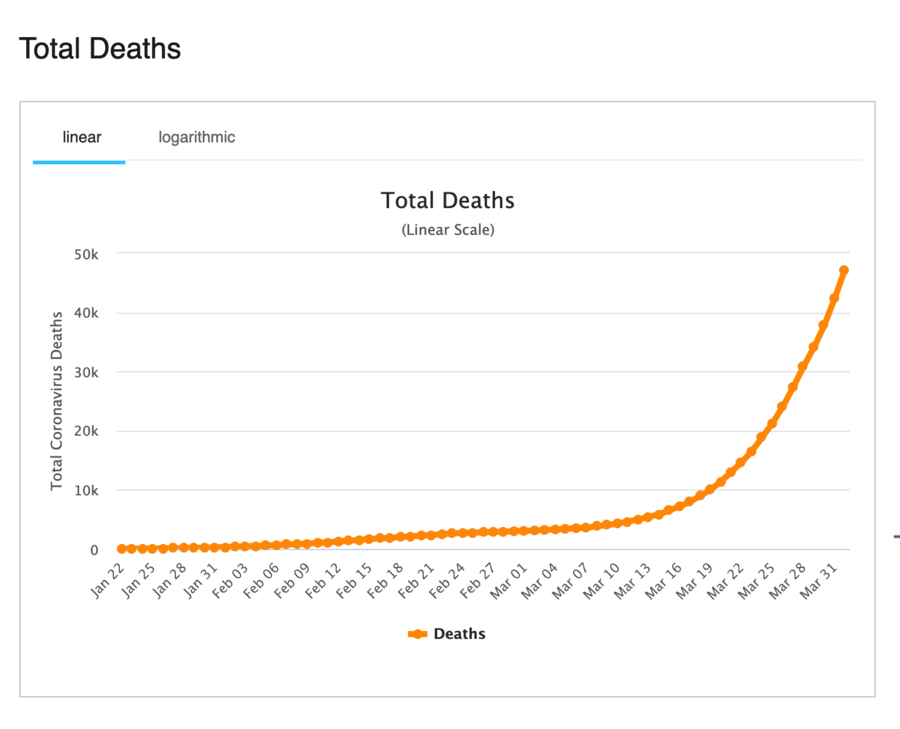
Does a meme comparing the novel coronavirus deaths to other leading causes of death contain accurate figures? No, it does not: The meme understates some numbers while overstating others. It uses the data to suggest the national response to the COVID-19 global pandemic is overblown.
The claim surfaced in a post (archived here) published on Facebook by Brad Winegardner on March 29, 2020. It opened:
Keep Everything in Context! Question The Agenda:
"Source: University of Hamburg, Germany DataThe number of deaths in the world in the first two months of 2020
2,360 : Corona virus
69,602 : Common cold
140,584 : Malaria
153,696 : Suicide
193,479 : Road Accidents
240,950 : HIV
358,471 : Alcohol
716,498 : Smoking
1,177,141 : CancerThen, do you think Corona virus is dangerous?
Users on social media only saw this:
Lead Stories was unable to find the exact source of the data featured in this meme, which cited the University of Hamburg. Instead, we consulted global public health organizations such as the World Health Organization and the Centers for Disease Control and Prevention.
The meme suggested only 2,360 people had died due to COVID-19 in the first two months of 2020. However, this pandemic has not reached its peak - at least not in the United States - and is still an ongoing health crisis. According to worldometers.info, almost double that amount died just on March 31, 2020. As of that date, the coronavirus has killed more than 42,000 people worldwide, and the situation is not contained.
Here's a snapshot from worldometers.info on April 2, 2020 of the climbing death toll:
 In the Unites States alone, as of April 2, 2020, the death toll had exceeded 5,000.
In the Unites States alone, as of April 2, 2020, the death toll had exceeded 5,000.
The meme used a two-month snapshot of data - when the novel coronavirus was in its early stages - giving a misleading interpretation of this global pandemic. It also suggested efforts to contain the spread - from stay-at-home orders to social distancing measures - were overblown. After comparing fatality rates to other leading causes of death, it asked, "Then, do you think Corona virus (sic) is dangerous?"
The data in the post was not accurate.
It said the common cold was responsible for 69,602 deaths during the first two months of 2020. This would amount to more than 400,000 deaths a year. These numbers sound like figures for influenza, which is not the same as the common cold (different viruses cause them, and it is a milder infection). The WHO estimates the flu kills between 290,000 and 650,000 people every year. However, deaths are not as likely from the common cold, according to Health.com:
Colds generally don't result in any serious health issues like pneumonia, bacterial infections, hospitalizations, or deaths.
In 2017, 435,000 deaths worldwide were due to malaria, according to the WHO. That represents an average of 72,500 deaths every two months, not 140,584, as the meme noted.
Here are the other errors in the figures cited:
- Suicide kills almost 800,000 people per year, according to the WHO. That's an average of 133,333 every two months, compared to 153,696 in the meme.
- Road accidents kill 1.35 million people annually, said the CDC. That represents 225,000 people bi-monthly, slightly more than the post.
- HIV-related deaths are blamed for 770,000 fatalities, per the WHO. That is more than 128,000 every two months, half what the post suggested.
- Alcohol is believed to kill 3 million people worldwide every year, according to the WHO. That is 500,000 every two months, more than the post noted.
- Smoking, or tobacco use, causes more than 7 million deaths globally, said the CDC. That's 1.1 million deaths bi-monthly, more than the post.
- Cancer is the leading cause of deaths worldwide, with an estimated 9.6 million in 2018, according to the WHO. In other words, 1.6 million people die every two months from cancer-related illnesses. The post suggested 1.1 million.
All of which is to say, the post is filled with factual errors. Even so, the suggestion that the coronavirus is not a severe threat to public health is dangerous. For one thing, the coronavirus appears to be more contagious than the flu. Some of the other causes of death that the post mentioned are preventable; people could give up alcohol or smoking, for example, and the death rates would likely fall.
There are also many unknowns about this novel coronavirus, and comparing data from the initial outbreak to the leading causes of death is flawed.
There is a lot of misinformation online about the coronavirus. Here are some other fact checks by Lead Stories you may want to check out:
- Fact Check: Black People Are NOT Immune To The Dangers Of Coronavirus
- Fact Check: 60 Democrats Did NOT Vote Against Coronavirus Stimulus Bill
- Fact Check: Photos Do NOT Show People Falling Dead Of COVID-19 On Italy's Streets
- Fact Check: Coronavirus Test DOES Require Swab To Be Inserted Clear Through Nasal Passage
- Fact Check: Sky News Video About Coronavirus Victims In Italian Hospital Did NOT Get Taken Down
- Fact Check: Using A Sauna Or Hairdryer Will NOT Kill Coronavirus
- Fact Check: Helicopters Are NOT Spraying Disinfectants To Try To Eradicate Coronavirus
- Fact Check: Tanks NOT Arriving In San Diego, NO Martial Law
- Fact Check: Massachusetts State Police DO Warn Of Possible Scam Related To Coronavirus
- Fact Check: NOT A Photo Of Hundreds Of Coronavirus Dead In Italy
- Fact Check: Coronavirus Cases In U.S. NOT Linked To 5G Rollout
- Fact Check: Joe Biden Did NOT Test Positive For Coronavirus, As African Hoax Website Claims
- Fact Check: Homeland Security Is NOT Preparing To Mobilize The National Guard To Combat Coronavirus
- Fact Check: Italy Has NOT Mandated No Treatment Of All Elderly With Coronavirus
- Fact Check: A Banana A Day Does NOT Keep The Coronavirus Away
- Fact Check: 15 Minutes In Sauna Will NOT Kill The Coronavirus
- Fact Check: A Dog Vaccine Can NOT Be Used To Inoculate People Against Coronavirus
- Fact Check: The CDC Is NOT Warning People The Morel Mushroom Increases Coronavirus Risk By 200%
- Fact Check: Baby Formula NOT Necessarily Being Shipped For Free During Coronavirus Outbreak
- Fact Check: Train Was NOT Marked With "COVID-19" On Its Side
- Fact Check: NOT 10,000 Deaths In Virus Outbreak in Michigan, Washington, Idaho, North Dakota, Missouri, Mississippi
- Fact Check: CDC Did NOT Recommend Men Shave Their Beards To Protect Against Coronavirus
- Fact Check: Florida Man NOT Arrested For Robbery Using Cough As A Weapon
- Fact Check: Lysol Products Can Kill Older Strains Of Coronavirus, But Tests Have NOT Scientifically Proven They Kill Novel Coronavirus
- Fact Check: Hair Weaves And Lace Front Wigs Made In China NOT Likely To Contain Coronavirus
- Fact Check: Scientists Did NOT Discover That Cocaine Kills Coronavirus
- Fact Check: NO Evidence Coronavirus Is Bioweapon Leaked From Wuhan Lab
- Fake News: Six Coronavirus Cases NOT Confirmed In Wichita, Kansas (Or Several Other U.S. Cities)
- Fake News: 20 Million Chinese Did NOT Convert To Islam, And It Was NOT Proven That Coronavirus Epidemic Did Not Afflict Muslims
- Fake News: NO Evidence To Support Claim From Bioweapons Expert Who Says Coronavirus Is Biological Warfare Weapon
- Fake News: Popping Bubble Wrap Does NOT Expose People To Coronavirus
- Fake News: Data From Windy.com Does NOT Show Massive Release Of Sulfur Dioxide Gas Near Wuhan
- Fake News: Latest Research Published By Chinese Scientists Did NOT Say Coronavirus Will Render Most Male Patients Infertile
- Fake News: NO Proof That High-Rise Buildings Have Become Human Incinerators To Combat Coronavirus
















